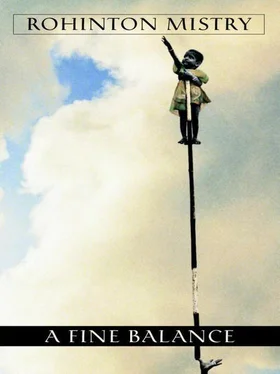Rohinton Mistry - A Fine Balance
Здесь есть возможность читать онлайн «Rohinton Mistry - A Fine Balance» весь текст электронной книги совершенно бесплатно (целиком полную версию без сокращений). В некоторых случаях можно слушать аудио, скачать через торрент в формате fb2 и присутствует краткое содержание. ISBN: , Жанр: Фантастика и фэнтези, на английском языке. Описание произведения, (предисловие) а так же отзывы посетителей доступны на портале библиотеки ЛибКат.
- Название:A Fine Balance
- Автор:
- Жанр:
- Год:неизвестен
- ISBN:978-1-55199-138-2
- Рейтинг книги:5 / 5. Голосов: 1
-
Избранное:Добавить в избранное
- Отзывы:
-
Ваша оценка:
- 100
- 1
- 2
- 3
- 4
- 5
A Fine Balance: краткое содержание, описание и аннотация
Предлагаем к чтению аннотацию, описание, краткое содержание или предисловие (зависит от того, что написал сам автор книги «A Fine Balance»). Если вы не нашли необходимую информацию о книге — напишите в комментариях, мы постараемся отыскать её.
A Fine Balance — читать онлайн бесплатно полную книгу (весь текст) целиком
Ниже представлен текст книги, разбитый по страницам. Система сохранения места последней прочитанной страницы, позволяет с удобством читать онлайн бесплатно книгу «A Fine Balance», без необходимости каждый раз заново искать на чём Вы остановились. Поставьте закладку, и сможете в любой момент перейти на страницу, на которой закончили чтение.
Интервал:
Закладка:
“Paan we don’t chew only,” said Ishvar. “But sometimes we like to smoke a beedi.”
“You will have to smoke it outside.”
The conditions were acceptable. “What is the address of your shop?” asked Ishvar. “Where do we bring the sewing-machines?”
“Right here. When you come next week, I will show you where to put them, in the back room.”
“Okayji, thank you, we will definitely come on Monday.” They waved to Maneck as they left. “We will see you again soon, hanh.”
“Sure,” said Maneck, waving back. Noticing Dina Dalai’s silent inquiry, he explained about their meeting on the train.
“You must be careful who you talk to,” she said. “Never know what kind of crooks you might run into. This is not your little hamlet in the mountains.”
“They seemed very nice.”
“Hmm, yes,” she said, reserving judgement. Then she apologized again for assuming he was a tailor. “I could not see you properly because you were standing behind them, my eyes are weak.” How silly of me, she thought, mistaking this lovely boy for a bowlegged tailor. And so sturdy too. Must be the famous mountain air they talk about, the healthy food and water.
She peered a little closer, tilting her head to one side. “It has been over twenty years, but I can recognize your mummy in your face. You know Aban and I were in school together.”
“Yes,” he said, uncomfortable under her intense scrutiny. “Mummy told me in her letter. She also wanted to let you know I’ll move in from next month, and she’ll mail you the rent cheque.”
“Yes, yes, that’s all right,” she said, dismissing his concern about the details and drifting again into the past. “Real little terrors we used to be in our school-days. And a third girl, Zenobia. When we three were together, it was trouble with a capital t, the teachers would say.” The memory brought a wistful smile to her face. “Anyway, let me show you my house, and your room.”
“You live here as well?”
“Where else?” As she led him through the dingy little flat, she asked what he was taking at college.
“Refrigeration and air-conditioning.”
“I hope you will do something about this hot weather then, make my home more comfortable.”
He smiled feebly, saddened by the place in which she resided. Not much better than the college hostel, he thought. And yet, he was looking forward to it. Anything would do, after what had happened there. He shuddered and tried to think of something else.
“This one will be your room.”
“It’s very nice. Thank you, Mrs. Dalai.”
There was a cupboard in one corner with a scratched, misshapen suitcase on top. A small desk stood beside the cupboard. Here, as in the front room, the ceiling was dark and flaking, the walls discoloured, missing chunks of plaster in several places. Other stark patches, recently cemented, stood out like freshly healed wounds. Two single beds lay at right angles along the walls. He wondered if she would sleep in the same room.
“I will move one bed into the other room for myself.”
He looked through the door beyond and glimpsed a room tinier and in worse condition, crowded by a cupboard (also with a suitcase on top), a rickety table, two chairs, and three rusting trunks stacked on a trestle.
“I am turning you out of your own room,” mumbled Maneck, the surroundings depressing him rapidly.
“Don’t be silly.” Her tone was brisk. “I wanted a paying guest, and it is my great good luck to get a nice Parsi boy — the son of my schoolfriend.”
“It’s very kind of you, Mrs. Dalai.”
“And that’s another thing. You must call me Dina Aunty.”
Maneck nodded.
“You can bring your things here any time. If you are not happy with the hostel, this room is ready — we don’t have to wait for a special date next month.”
“No, it’s all right, but thank you, Mrs. -”
“Ahn, careful.”
“I mean, Dina Aunty.” They smiled.
When Maneck left her flat, she began pacing the room, suddenly restless, as though about to embark on a long voyage. No need now to visit her brother and beg for next month’s rent. She took a deep breath. Once again, her fragile independence was preserved.
Tomorrow she would bring home the first batch of sewing from Au Revoir Exports.
I. City by the Sea
DINA DALAI SELDOM INDULGED in looking back at her life with regret or bitterness, or questioning why things had turned out the way they had, cheating her of the bright future everyone had predicted for her when she was in school, when her name was still Dina Shroff. And if she did sink into one of these rare moods, she quickly swam out of it. What was the point of repeating the story over and over and over, she asked herself — it always ended the same way; whichever corridor she took, she wound up in the same room.
Dina’s father had been a doctor, a GP with a modest practice who followed the Hippocratic oath somewhat more passionately than others of his profession. During the early years of Dr. Shroff’s career, his devotion to his work was diagnosed, by peers, family members, and senior physicians, as typical of youthful zeal and vigour. “How refreshing, this enthusiasm of the young,” they smiled, nodding sagely, confident that time would douse the fires of idealism with a healthy dose of cynicism and family responsibilities.
But marriage, and the arrival of a son, followed eleven years later by a daughter, changed nothing for Dr. Shroff. Time only sharpened the imbalance between his fervour to ease suffering and his desire to earn a comfortable income.
“How disappointing,” said friends and relatives, shaking their heads. “Such high hopes we had for him. And he keeps slaving like a clerk, like a fanatic, refusing to enjoy life. Poor Mrs. Shroff. Never a vacation, never a party — no fun at all in her existence.”
At fifty-one, when most GPS would have begun considering options like working half-time, hiring an inexpensive junior, or even selling the practice in favour of early retirement, Dr. Shroff had neither the bank balance nor the temperament to permit such indulgences. Instead, he volunteered to lead a campaign of medical graduates bound for districts in the interior. There, where typhoid and cholera, unchallenged by science or technology, were still reaping their routine harvest of villagers, Dr. Shroff would try to seize the deadly sickles or, at the very least, to blunt them.
But Mrs. Shroff undertook a different sort of campaign: to dissuade her husband from going into what she felt were the jaws of certain death. She attempted to coach Dina with words to sway her father. After all, Dina, at twelve, was Daddy’s darling. Mrs. Shroff knew that her son, Nusswan, could be of no help in this enterprise. Enlisting him would have ruined any chance of changing her husband’s mind.
The turning point in the father-and-son relationship had come seven years ago, on Nusswan’s sixteenth birthday. Uncles and aunts had been invited to dinner, and someone said, “Well, Nusswan, you will soon be studying to become a doctor, just like your father.”
“I don’t want to be a doctor,” Nusswan answered. “I’ll be going into business — import and export.”
Some of the uncles and aunts nodded approvingly. Others recoiled in mock horror, turning to Dr. Shroff. “Is this true? No father-son partnership?”
“Of course it’s true,” he said. “My children are free to do whatever they please.”
But five-year-old Dina had seen the hurt on her father’s face before he could hide it. She ran to him and clambered onto his lap. “Daddy, I want to be a doctor, just like you, when I grow up.”
Everyone laughed and applauded, and said, Smart little girl, knows how to get what she wants. Later, they whispered that the son was obviously not made of the same solid stuff as the father — no ambition, wouldn’t amount to much.
Читать дальшеИнтервал:
Закладка:
Похожие книги на «A Fine Balance»
Представляем Вашему вниманию похожие книги на «A Fine Balance» списком для выбора. Мы отобрали схожую по названию и смыслу литературу в надежде предоставить читателям больше вариантов отыскать новые, интересные, ещё непрочитанные произведения.
Обсуждение, отзывы о книге «A Fine Balance» и просто собственные мнения читателей. Оставьте ваши комментарии, напишите, что Вы думаете о произведении, его смысле или главных героях. Укажите что конкретно понравилось, а что нет, и почему Вы так считаете.












